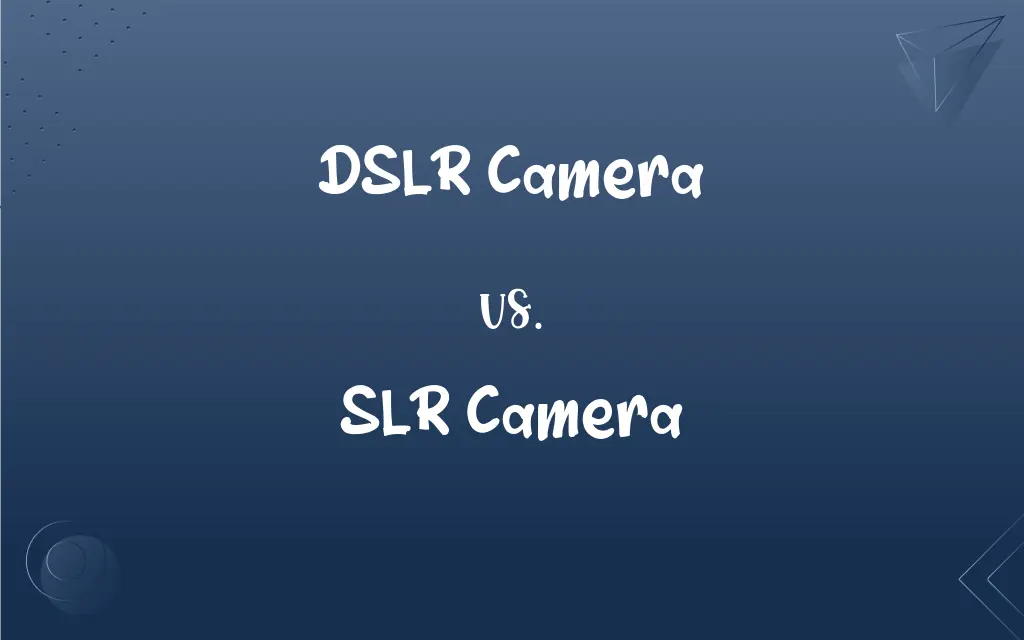DSLR Camera vs. SLR Camera: What's the Difference?
Edited by Janet White || By Harlon Moss || Published on January 18, 2024
DSLR Camera is a digital camera using a mirror mechanism to direct light from the lens to the viewfinder. SLR Camera is a camera using a single-lens reflex mechanism, typically using photographic film.

Key Differences
DSLR cameras incorporate digital imaging sensors, whereas SLR cameras traditionally use film to capture images. This fundamental difference marks the shift from analog to digital in photography.
In a DSLR camera, the image captured by the lens is directed onto a digital sensor, instantly converted into a digital image. An SLR camera directs the light onto a film strip, requiring physical development to view the image.
The digital aspect of DSLR cameras allows for immediate image review and numerous digital features like image editing. SLR cameras offer a more traditional photography experience, focusing on the basics of exposure and composition without instant feedback.
DSLR cameras generally offer higher versatility with features like various shooting modes, higher ISO ranges, and video recording capabilities. SLR cameras are valued for their mechanical simplicity and the unique quality of film photography.
Maintenance and operation of DSLR cameras can be more complex due to their electronic components, while SLR cameras are often praised for their durability and straightforward mechanical operation.
ADVERTISEMENT
Comparison Chart
Imaging Technology
Uses a digital sensor to capture images.
Uses photographic film.
Image Review
Immediate digital image preview on the camera screen.
Requires film development for image viewing.
Features
Advanced digital features, various shooting modes.
Traditional, mechanical operation without digital aids.
Versatility
High versatility in shooting conditions and media.
Focused on fundamental photographic principles.
Maintenance
Requires care for electronic components.
Mechanical durability, less complex maintenance.
ADVERTISEMENT
DSLR Camera and SLR Camera Definitions
DSLR Camera
A digital camera combining optical mechanisms with digital imaging.
He used his DSLR camera to capture stunning high-resolution landscapes.
SLR Camera
Known for its mechanical precision and optical quality.
The photographer appreciated the crisp images from her SLR camera.
DSLR Camera
Suitable for both amateur and professional photography.
His first DSLR camera greatly improved his photographic skills.
SLR Camera
Valued for the unique aesthetic of film photography.
Her SLR camera captured the warm tones that digital cameras couldn't replicate.
DSLR Camera
Allows for high-quality video recording alongside stills.
She filmed the entire documentary using a DSLR camera.
SLR Camera
A camera using a mirror and prism system with film as the medium.
He loaded a new roll of film into his vintage SLR camera.
DSLR Camera
Features interchangeable lenses and a reflex mirror system.
The photographer switched lenses on her DSLR camera for the portrait shoot.
SLR Camera
Requires manual adjustment of settings like aperture and shutter speed.
He adjusted the settings on his SLR camera to capture the low-light scene.
DSLR Camera
Offers immediate image review and extensive manual controls.
After taking the shot, she reviewed the image on her DSLR camera's screen.
SLR Camera
Offers a direct optical view through the lens via a reflex mirror.
Looking through the SLR camera's viewfinder, he framed the perfect shot.
FAQs
Can DSLR cameras use film?
No, they use digital sensors to capture images.
What is an SLR camera?
A camera using a single-lens reflex mechanism with film.
Are DSLR cameras heavier than SLR cameras?
Generally, yes, due to additional electronic components.
How does image quality compare between DSLR and SLR cameras?
Image quality is subjective; DSLRs offer high resolution, while SLRs provide distinct film aesthetics.
Can DSLR cameras shoot videos?
Yes, most modern DSLRs have video recording capabilities.
Do SLR cameras require batteries?
Some need batteries for light meters, but they don’t rely on batteries for basic functions.
Is it easier to learn photography with a DSLR or SLR camera?
DSLRs are often considered easier for beginners due to their immediate feedback and automated settings.
Do SLR cameras have a digital display?
No, they don’t have digital displays for image preview.
Do professional photographers prefer DSLR or SLR cameras?
It varies based on personal preference and the type of photography.
What does DSLR stand for?
Digital Single-Lens Reflex.
Why do photographers still use SLR cameras?
For the unique quality and experience of film photography.
How does film sensitivity in SLR cameras compare to ISO in DSLRs?
Film sensitivity is similar to ISO, but it's fixed per film roll, while ISO in DSLRs is adjustable.
Can I use old lenses from an SLR on a DSLR?
Some DSLRs can use SLR lenses with appropriate adapters.
Do both DSLR and SLR cameras offer autofocus?
Modern DSLRs have autofocus, while most SLRs rely on manual focus.
Are DSLR cameras suitable for all weather conditions?
Many DSLRs are weather-sealed, but it varies by model.
Is film for SLR cameras still widely available?
Yes, though less common, film can still be sourced for SLR cameras.
Do DSLR cameras offer manual controls?
Yes, DSLRs provide extensive manual control options.
Are SLR cameras more durable than DSLRs?
Generally, SLRs are more mechanically robust, but this can vary.
Can I edit images in a DSLR camera?
Some DSLRs offer basic on-camera editing features.
Can I see images immediately after taking them on an SLR camera?
No, film needs to be developed to view images.
About Author
Written by
Harlon MossHarlon is a seasoned quality moderator and accomplished content writer for Difference Wiki. An alumnus of the prestigious University of California, he earned his degree in Computer Science. Leveraging his academic background, Harlon brings a meticulous and informed perspective to his work, ensuring content accuracy and excellence.
Edited by
Janet WhiteJanet White has been an esteemed writer and blogger for Difference Wiki. Holding a Master's degree in Science and Medical Journalism from the prestigious Boston University, she has consistently demonstrated her expertise and passion for her field. When she's not immersed in her work, Janet relishes her time exercising, delving into a good book, and cherishing moments with friends and family.






































































